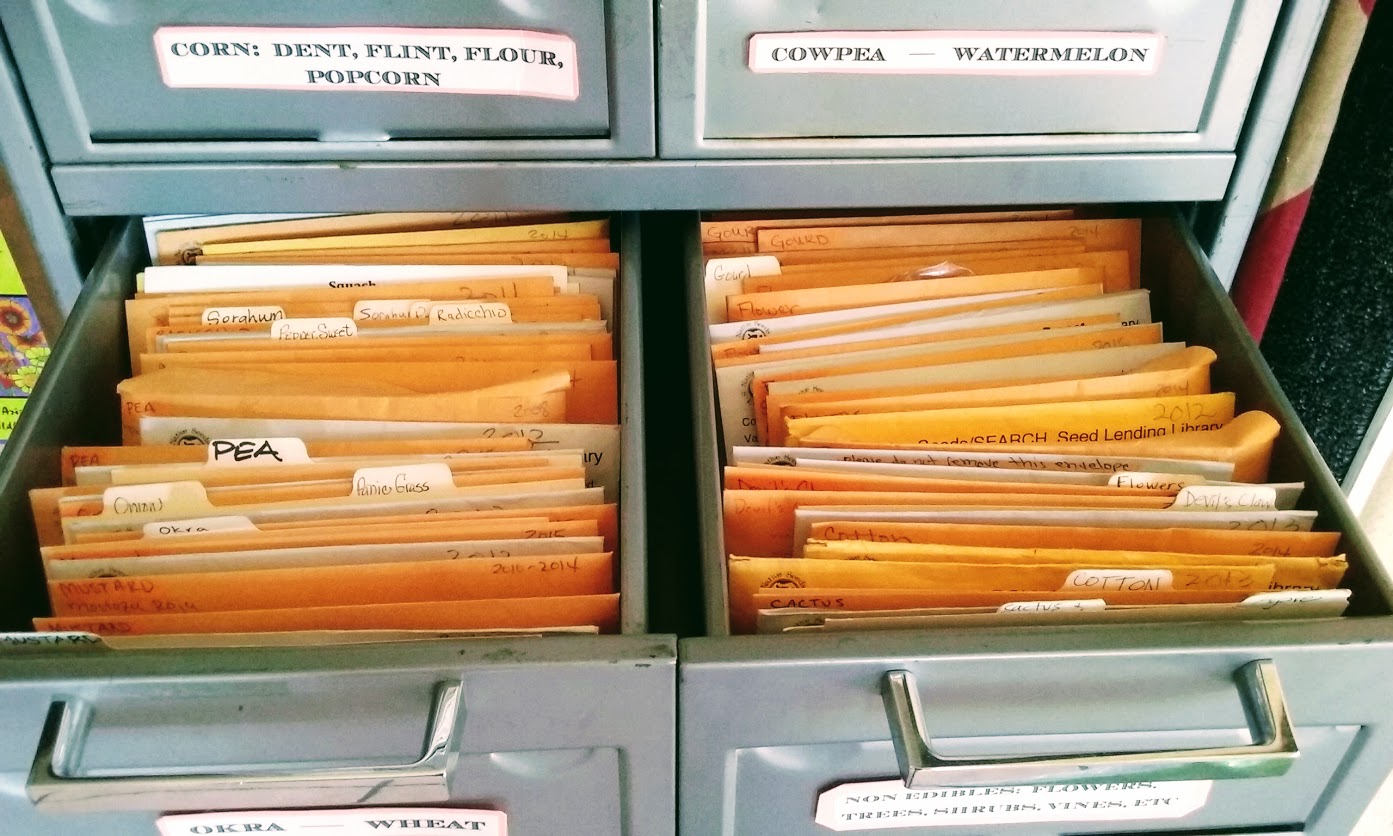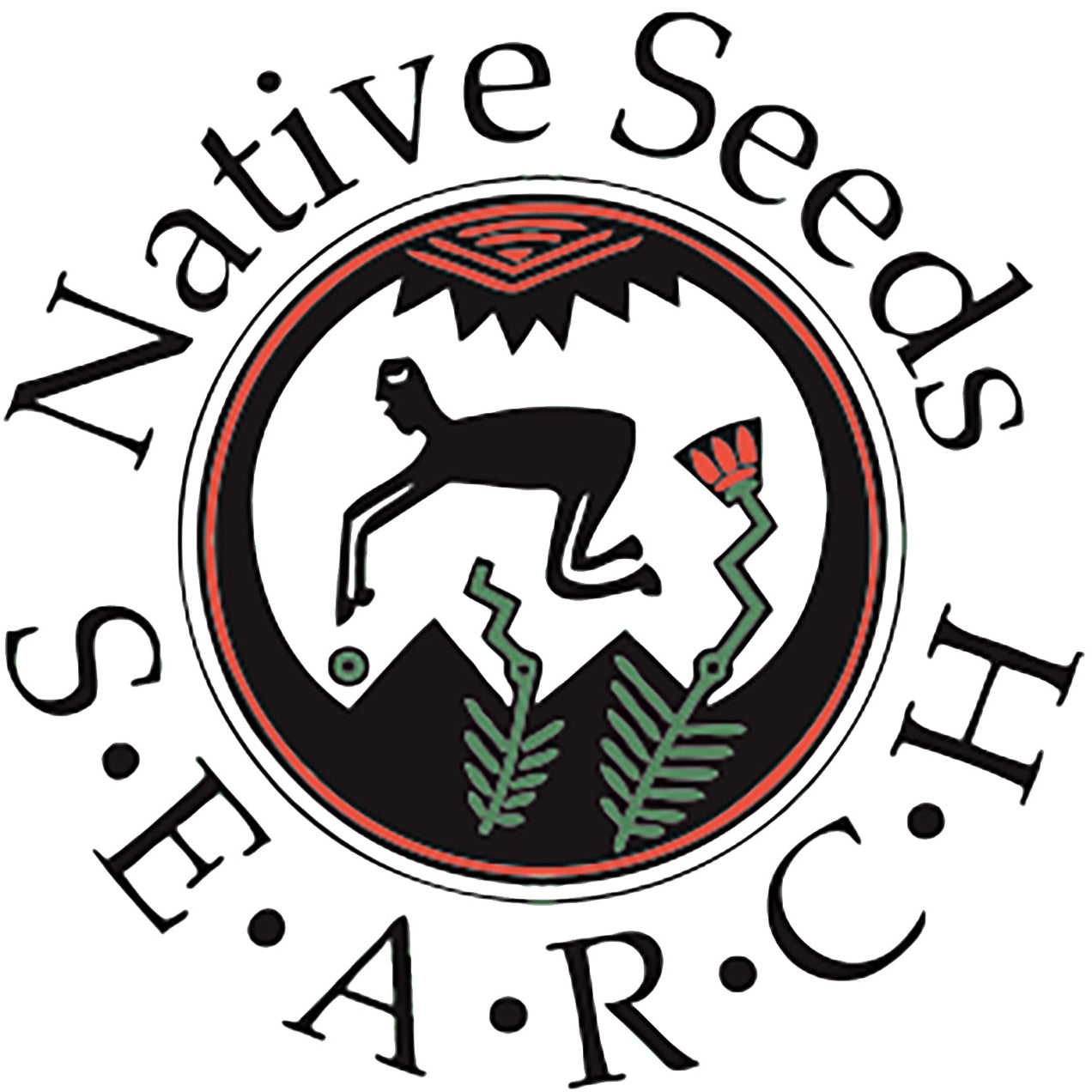
Article published by Melissa Barrow, NS/S Retail and Membership Associate, published January 31, 2017.
In January 2012, Native Seeds/SEARCH started the first seed library in Arizona, quickly followed by the Pima County Public Library. January and February 2017 mark the 5th year anniversaries for both of these seed libraries.
Visiting the public library has been a delight for as long as I can remember. My mom starting riding me there on the back of her bike when I was three, and we’d spend hours picking out fun, interesting books or stories on vinyl records to bring home. There’s something about wandering around a library – in the quiet company of other people engaged in similar exploration – that awakens the mind’s thirst to know and to do. That’s the marvelous thing about a library: it’s filled with information and entertainment that everyone can share for free! Libraries are a community treasure – the original avenue for recycling, reducing needless accumulation in the home, and providing access to rare treasures not easily found in stores. Libraries have come a long way since the early 1970s of my childhood. These days, in addition to books and records, one can find audiobooks and music on CD, films on DVD, magazines, computers with internet access, and… SEEDS! In fact, there are now libraries dedicated only to seeds. Who knew?! I didn’t until I came to work for Native Seeds/SEARCH in 2014..
WHAT ARE SEED LIBRARIES AND WHY SHOULD WE CARE ABOUT THEM?
Seed libraries are places where members of the community can obtain seeds that grow in their region at little to no cost. They are operated for the benefit of the public and rely on the cooperation of local gardeners and/or farmers to be consistent in the practice of saving seeds and returning them to keep the libraries going. The seeds in a community library are generally heirloom, open-pollinated, GMO-free and often organically grown. Because seeds within a seed library are often saved by home gardeners within the community, they are typically more genetically diverse and locally adapted compared to many commercially available seeds.
People have saved and shared seeds for thousands of years. Beginning in the 1980's, large corporations began to buy out small seed distributors resulting in what we experience today: complex issues of patents, chemicals, and genetic engineering ultimately leading to a loss of crop diversity. According to several studies since the 1980s, some 60-100,000 plants are in danger of extinction, and since 1903 we have lost 93% of our heirloom varieties of crops. (1, 2) Genetic diversity is crucial to the food security of any region, and indigenous farmers across the globe have spent centuries on natural selection and cross-breeding to favor the best traits for growing in their unique climates. Industrial agriculture favors genetic uniformity and mono-cropping – widespread planting of a single, high-yield variety of a crop like corn or soybeans. The seeds of such crops have been genetically engineered and/or chemically modified to withstand either pests or pesticides, and are patented, requiring farmers to sign agreements not to save or share the seeds. It’s deep in the nature of humans to save seed though, despite the punitive measures of large corporations, as evidenced in a 2013 report by the Center for Food Safety: By the end of 2012, Monsanto had received over $23.5 million from patent infringement lawsuits against farmers and farm businesses. (3)
Seed libraries are one response of community organizers and activists to this loss of diversity and takeover of our seeds and, ultimately, our foods. They are a place to do what humans have always done: save and trade our local varieties of seed and grow our own food. In 2000, the first seed library –BASIL (Bay Area Seed Interchange Library) was started in Berkeley Ca, by Sascha Du Brul and Chris Shein. Others quickly followed, and today there are now about 460 seed lending libraries open in 46 states and 15 countries! (4)

In January 2012, Native Seeds/SEARCH started the first seed library in Arizona, quickly followed by the Pima County Public Library, which launched 8 simultaneously with interlibrary loans to 27 branches in Arizona. January and February 2017 mark the 5th year anniversaries for both of these seed libraries. The NS/S Seed Library, located in the NS/S Retail Store, offers seeds to check out and plant in your garden. The borrower promises to attempt to save seeds and return to the library if successful. In addition, through our educational offerings and Community Seed Grant programs, Native Seeds/SEARCH has supported several seed libraries in the Southwest including libraries in Phoenix, Albuquerque, Flagstaff, and rural communities throughout Arizona, Colorado, and New Mexico.
WHAT’S IN THE NS/S SEED LIBRARY?
We feature primarily edibles, but there are also wildflowers, shrubs, vines, and tree seeds. Much of our library stock was grown from packets obtained from NS/S, but we regularly receive donations of seeds saved and stewarded by growers in our regions. Current library offerings include, butterfly milkweed (in high demand, can’t keep it in stock) a squash variety from Iran, and, most recently, a fourth-generation, bi-color sweet corn and a Santa Fe Grande green (“Guero”) chile, both donated from Pecos, NM.

HOW DOES IT WORK?
Anyone visiting the NS/S store can check out seeds. For those unable to visit our Tucson store we recommend contacting your nearest community seed library. For a list of seed libraries in the U.S. and beyond visit the seed libraries website. Unfortunately, we are not able to offer mail-order for our Seed Library seeds.
All that’s required is to fill out a card with your name and the location of your garden. This card will be kept on file, and each time you come in for seeds, you note which varieties you took and how many. We usually have complimentary envelopes or baggies in which to take home the seeds, but if you can bring your own it helps us keep the cost down. The rules of the library are:
- Take only what you need, leaving some seeds for others
- Leave any planting instructions (such as the original packet) for everyone to see
- Let some of your plants go to seed and bring some back to the library! *When bringing seeds back, please fill out our Seed Donation form with as much information about as possible, including the variety, any planting/growing tips, and the level of difficulty for saving the seeds.
This last rule is the most important part of keeping a seed library alive. Part of the point of a seed library is to increase the number of people growing plants that are indigenous to – or have a long history in – the region. This contributes to food security, but it also helps keep local plant varieties from going extinct. At the Pima County library, the seeds are in the digital system and borrowers receive return reminders just as with books. The NS/S Seed Library is still doing things the old-fashioned way. We’re on the honor system here, so borrowers, please help us keep it going by returning seeds! We realize that not all gardening and seed saving attempts are successful and understand if you are not able to return seeds. Know that we are here to help!

TO BUY OR TO BORROW?
You might be wondering why anyone would bother to buy their seeds if they can just check them out at the library?
BENEFITS OF BORROWING SEED
- Access to unique varieties that may not be available for sale
- Focus on locally-adapted/regional heirloom varieties
- Access to tips/stories from other growers in the community
- Encourages you to learn more about what you grow
- Increases the pool of seeds available to the community
- Engages us with the full cycle of food to table by practicing the seed to seed cycle
- Saves money
BENEFITS OF BUYING SEED
- Seeds are required to be germination-tested by vendor, so high likelihood of viability
- Confidence that seeds will grow true to type and were produced to prevent unwanted cross-pollination or inadvertent hybrids
- Supports your local seed store or nonprofit (assuming you buy from small seed distributors rather than big box stores)
- Greater and more consistent selection vs a library which is limited to what people have donated
- No responsibility to return seed
As you can see, seed libraries are a wonderful resource to utilize and support and may compliment your seed purchases. So come out and explore the NS/S Seed Library, or one nearest to where you live. Who knows what treasures you may discover? It’s never too late to befriend your local seeds and seed stewards!
INTERESTED TO KNOW MORE ABOUT STARTING A SEED LIBRARY OR SAVING SEEDS?
Check out these excellent books, available at the NS/S store 3061 N Campbell Ave, Tucson, AZ 85719 or online at www.nativeseeds.org.
Seed Libraries and Other Means of Keeping Seeds in the HANDS of the PEOPLE by Cindy Conner
Basic Seed Saving by Bill McDorman
Or check out some of these veteran seed libraries for great ideas:
Basil Seed Library (The first seed library, est 2000)
Richmond Grows Seed Lending Library (est. 2004)
Seed Libraries Social Network (Seed library social networking site (est. 2011)
